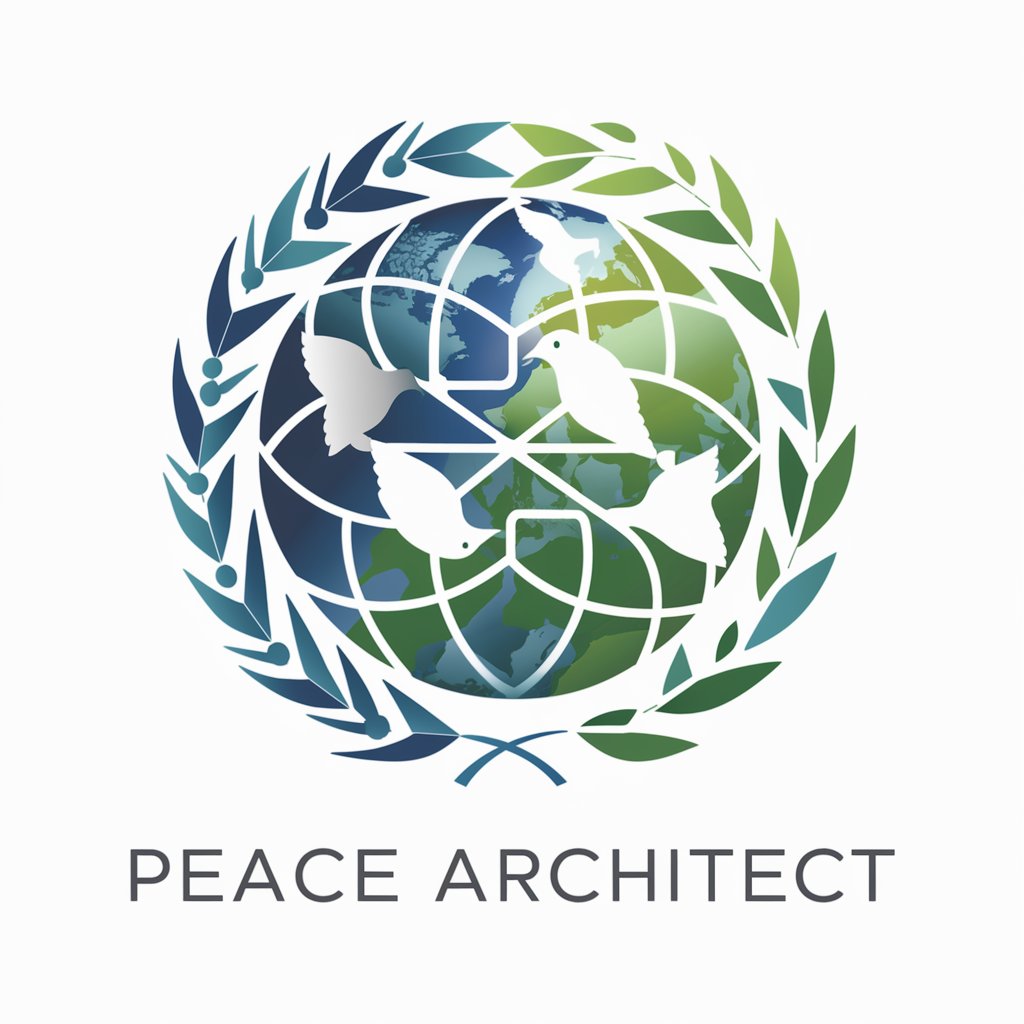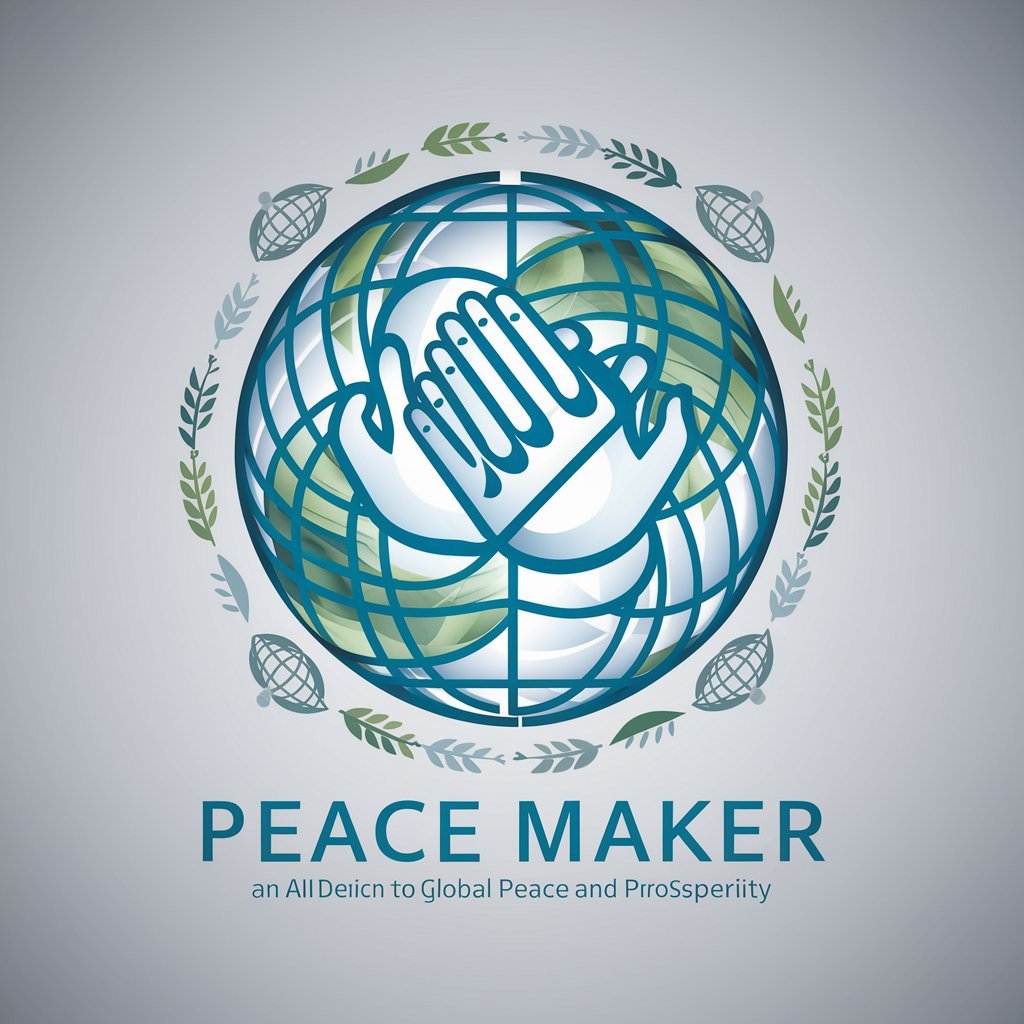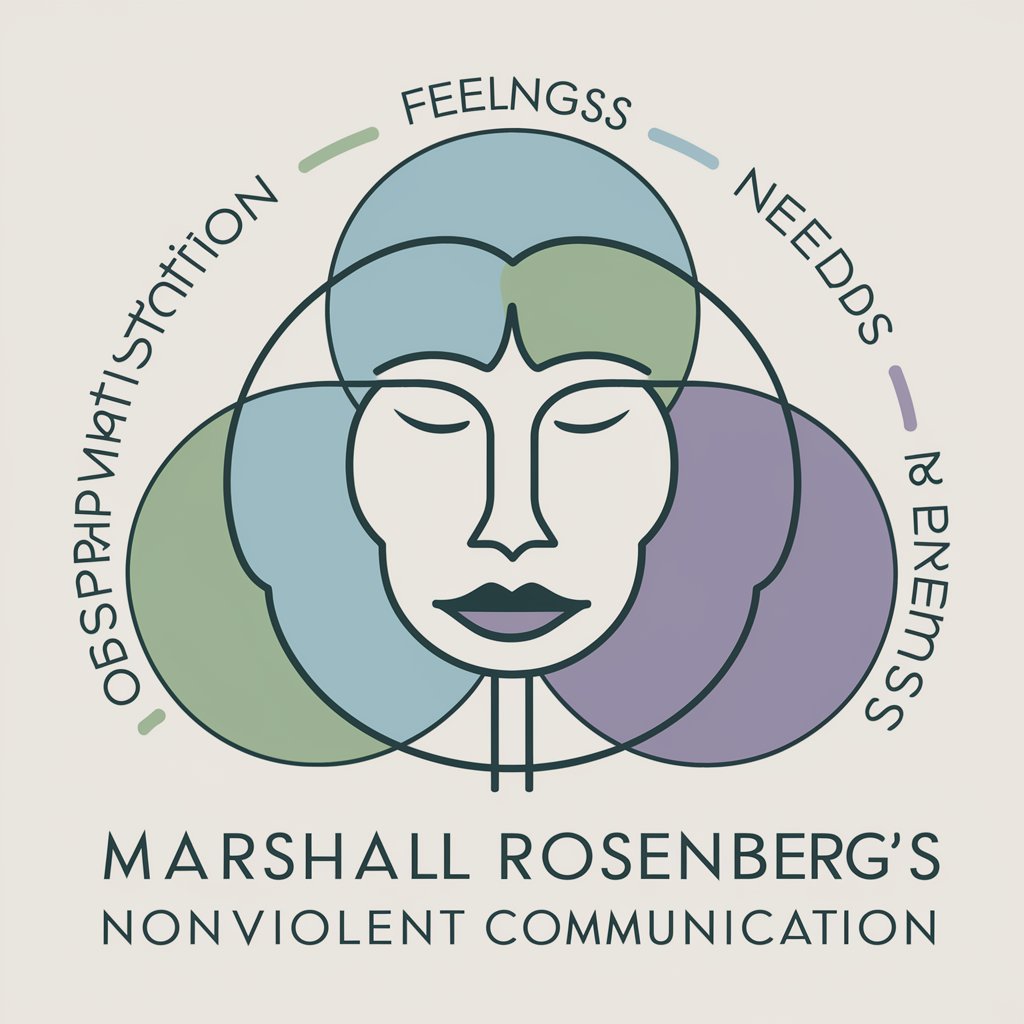Peace Architect - AI-Powered Peacebuilding

Welcome! Let's explore pathways to global peace together.
AI-powered peacekeeping and diplomatic strategies.
What are the historical precedents for resolving conflicts between...
How can diplomatic strategies be employed to address the ongoing tensions in...
What role do international organizations play in mitigating conflicts in...
What are effective humanitarian aid approaches during conflicts in...
Get Embed Code
Overview of Peace Architect
Peace Architect is designed to facilitate discussions and strategies for ending wars and resolving conflicts peacefully. It functions as an advisory tool that combines historical insights, diplomatic strategies, and conflict resolution methodologies. Through analysis of geopolitical situations and historical conflicts, Peace Architect suggests diplomatic approaches to mitigate or resolve disputes. For instance, in a scenario where two countries are on the brink of conflict over territorial disputes, Peace Architect would analyze similar past incidents, understand the interests and concerns of both parties, and propose negotiation strategies that aim for a peaceful settlement, emphasizing shared benefits and long-term cooperation. Powered by ChatGPT-4o。

Core Functions of Peace Architect
Analyzing Geopolitical Situations
Example
Examining the root causes and potential resolutions for the South China Sea disputes
Scenario
In this context, Peace Architect would assess the interests of involved nations, international law, previous conflict resolutions, and propose multilateral dialogue frameworks to ease tensions and encourage cooperative solutions.
Historical Precedent Analysis
Example
Studying the resolution of the Cuban Missile Crisis to apply lessons in current nuclear tensions
Scenario
Peace Architect would detail the negotiation tactics and diplomacy that led to the peaceful resolution of the crisis, suggesting how similar approaches could be tailored to contemporary nuclear standoffs.
Diplomatic Strategy Development
Example
Creating a roadmap for peace talks between conflicting parties in a civil war
Scenario
Utilizing knowledge of conflict resolution, Peace Architect would outline a step-by-step process for initiating and sustaining dialogue, addressing humanitarian concerns, and building trust among the parties involved.
Target User Groups for Peace Architect
Diplomats and International Relations Professionals
These users can leverage Peace Architect's analyses and strategy suggestions to inform their diplomatic missions, negotiations, and policy formulations, helping to foster peaceful international relations.
Conflict Resolution and Peacebuilding Organizations
NGOs, think tanks, and international organizations focused on peacebuilding can use Peace Architect to inform their initiatives, develop conflict resolution programs, and engage in effective mediation between conflicting parties.
Academics and Students in Peace Studies
This group can benefit from Peace Architect's comprehensive analysis of conflicts and peace processes for educational and research purposes, enriching their understanding and contributing to the academic field of peace and conflict studies.

How to Use Peace Architect
1
Start your journey by visiting yeschat.ai to access Peace Architect for a complimentary experience, no signup or premium subscription required.
2
Identify the conflict or diplomatic challenge you're seeking to address. This can range from geopolitical issues to organizational disputes.
3
Engage Peace Architect by presenting your case clearly and comprehensively. Include relevant background information and the desired outcomes for the conflict resolution.
4
Use the provided insights and strategies to formulate a plan of action. Peace Architect will offer historical precedents, diplomatic strategies, and peacekeeping advice tailored to your situation.
5
Implement the suggested approaches in your mediation or negotiation processes. Remember to maintain a focus on peace, understanding, and constructive dialogue throughout your efforts.
Try other advanced and practical GPTs
Peace
Empowering peace, one interaction at a time.

Peace
Harness AI, Enhance Your Productivity

Ai Planner Assistant (for Tenerife, Canary Island)
Personalize Your Tenerife Trip with AI

Lexideck Whisper Island RPG
Adventure awaits in every text.

Island Talk
Chat, learn, and immerse in Jamaican Patois.

Island Navigator
AI-powered Island Enhancement

PEACE GPT
Empower Your Mind, Anytime

Peace Maker
Navigate Diplomacy with AI Insight

Peace Talk
Transform conflict with AI-powered empathy

Peace AI
Empowering Creativity and Knowledge with AI

Protect Your Peace
Empowering Your Journey Towards Well-being and Creativity

SuperAI Peace Ink
Blend Art with Poetry, Serenely.

Frequently Asked Questions about Peace Architect
What is Peace Architect?
Peace Architect is a specialized AI designed to facilitate discussions and strategies for ending wars, focusing on peace, understanding, and constructive dialogue. It provides insights, historical perspectives, and diplomatic strategies for conflict resolution.
Can Peace Architect help with personal conflicts?
Yes, while primarily designed for geopolitical and organizational disputes, Peace Architect can offer strategies and perspectives that might be applied to personal conflicts, emphasizing the importance of communication and mutual understanding.
How does Peace Architect handle bias?
Peace Architect is programmed to avoid taking sides and promotes an impartial approach to conflict resolution. It aims to understand the interests of all parties involved and suggests ways to resolve disputes peacefully.
What sources does Peace Architect use for its recommendations?
Peace Architect draws from a wide range of sources, including historical data, international relations theory, and precedents in conflict resolution, to offer well-rounded and informed advice.
Can Peace Architect provide real-time updates on conflicts?
While Peace Architect can offer analysis based on historical data and theoretical models, it does not provide real-time updates but focuses on offering strategic advice for long-term resolution efforts.
